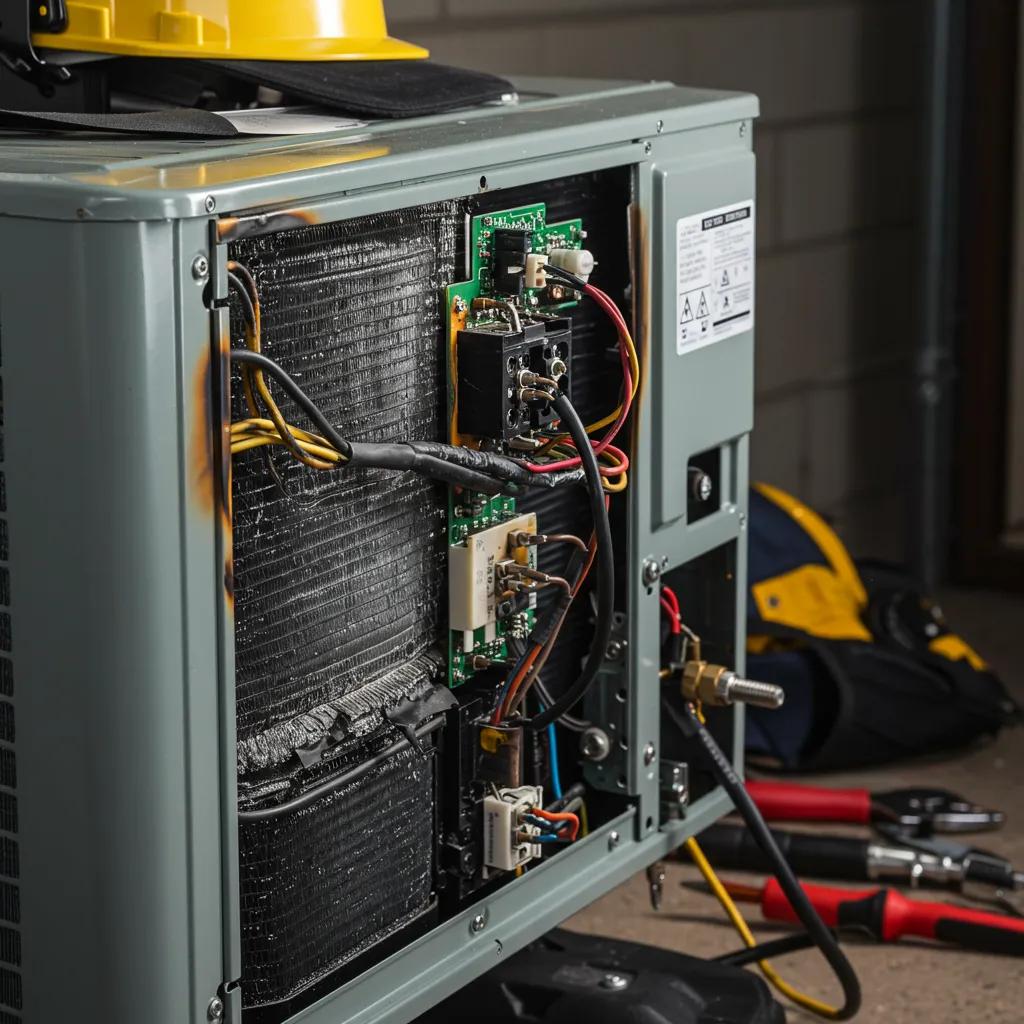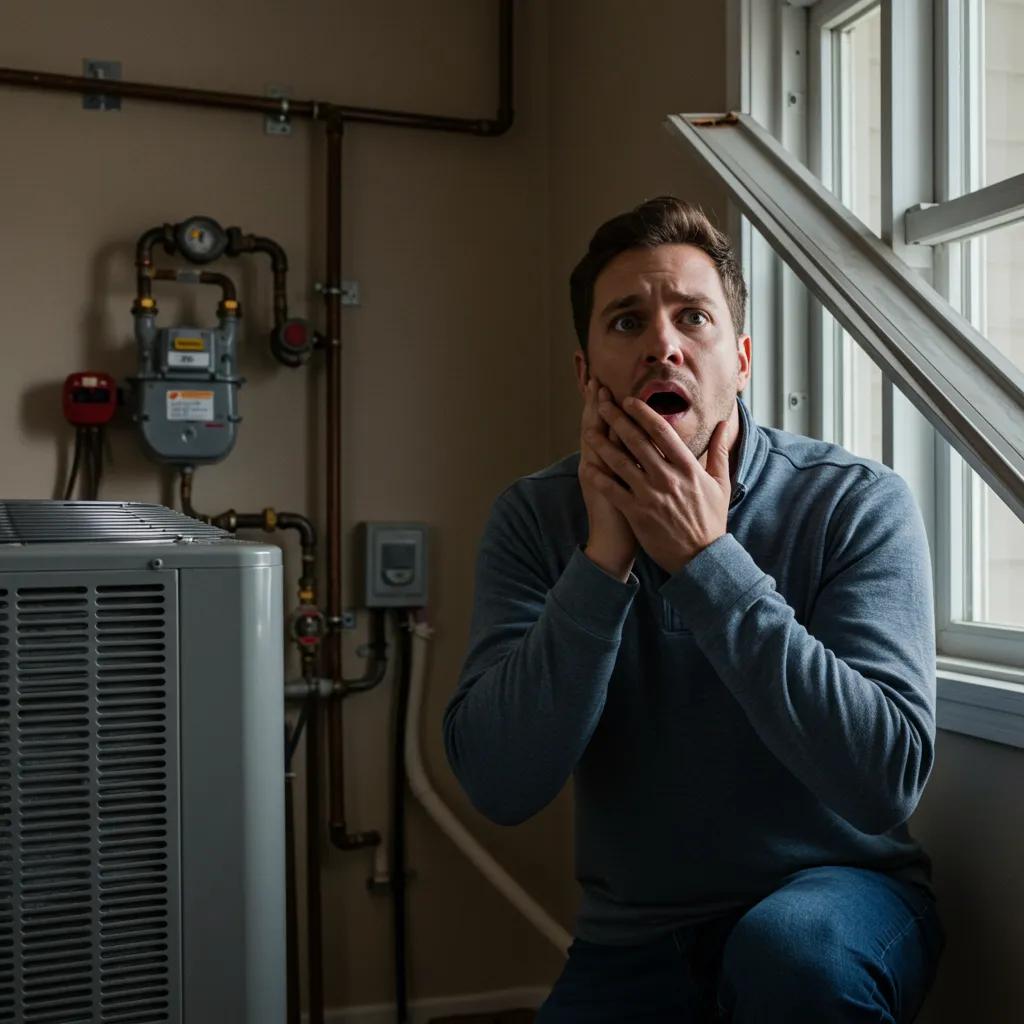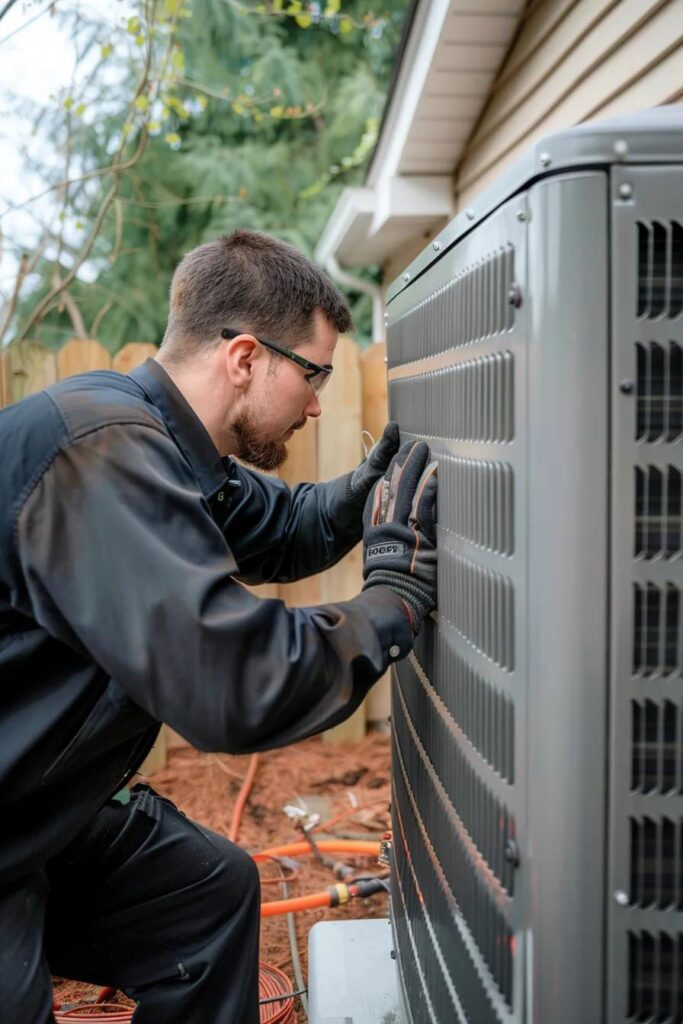Identify and Troubleshoot Unusual HVAC Smells
Unusual odors emanating from your air system can signal significant safety concerns, hidden issues, or hygiene problems within your home or business. Addressing HVAC smells promptly is crucial for safeguarding your indoor air quality, preventing costly repairs, and ensuring everyone’s well-being. This guide will help you understand why you might detect smells of burning, rotten eggs, mustiness, dirty socks, chemicals, sewage, or even animals. You’ll learn how to identify potential dangers and discover the effective solutions our experts at Ellis County Climate Control provide. Get ready to recognize the warning signs, take immediate safety precautions, understand professional diagnostic methods, and implement maintenance strategies to keep your air fresh in Waxahachie, Midlothian, Ennis, and surrounding communities.
What's Causing That Burning Smell from Your AC or Heater?

A burning smell typically indicates that electrical components are overheating or that foreign material is contacting hot surfaces, posing a risk that requires immediate attention. Issues with the electrical system, motor friction, and accumulated dust can all contribute to this sharp, acrid odor.
Let’s explore the common sources:
| Component | Potential Issue | Resulting Odor |
|---|---|---|
| Blower Motor | Overheated bearings | Smell of burnt fabric or plastic |
| Wiring Insulation | Loose or damaged wires | Odor of burning rubber or plastic |
| Air Filter / Ducts | Excessive dust and debris buildup | A musty smoke scent when heated |
This overview highlights that a burning smell often points to a motor problem or an electrical hazard, guiding you toward the necessary safety measures.
Why Does My AC Emit a Burning Plastic or Electrical Component Smell?
Your AC might smell like burning plastic if the wire insulation is softening due to excessive electrical current or if components on the circuit board are overheating. Over time, loose connections, failing capacitors, and worn-out motors generate heat that degrades plastic coatings. Inspecting electrical panels and blower compartments for scorch marks or melted coverings can confirm this issue and help prevent potential fires.
How Can Dust or Debris Lead to a Burning Odor in HVAC Systems?
When dust accumulates on heating coils or fan blades, it can ignite when the system activates, producing a sharp, smoky smell. This often occurs after the system has been idle for a period or following work on the ductwork. Simply replacing the filter and vacuuming around the blower housing can often resolve this, but if significant residue is present, the coils will require professional cleaning.
What Are the Dangers of Overheated Motors or Frayed Wiring?
Overheated motors can seize, leading to damage to other components, while frayed wiring poses a risk of electrical sparks or ignition of the insulation. Both scenarios put occupants at risk of fire and can result in system failure. If you hear sizzling sounds or notice intermittent power interruptions, it’s a clear sign to address the issue before it escalates. ac repair
When Should You Shut Down Your HVAC System Due to a Burning Smell?
If you detect a burning smell that persists for more than a few seconds or observe smoke, turn off the system immediately via the thermostat or by using the circuit breaker. If you see signs of heat or sparks, evacuate the area and contact qualified technicians without delay. Shutting down the system promptly prevents further damage and significantly reduces the risk of a fire.
Identifying and Responding to a Rotten Egg Smell in Your HVAC System

A smell resembling sulfur or rotten eggs typically indicates a natural gas leak or the release of sulfur compounds, presenting an immediate health and explosion hazard. Recognizing this distinct odor and acting swiftly can avert serious danger.
| Warning Sign | Potential Cause | Immediate Action Required |
|---|---|---|
| Sulfur-like odor | Gas leak from furnace or supply line | Shut off gas supply and ventilate the area |
| Smell of unlit pilot light | Accumulation of unburned gas in the heat exchanger | Evacuate the premises and contact emergency services |
These indicators underscore the urgency: any hint of a rotten egg smell necessitates shutting down the system and seeking professional assistance.
What Does a Rotten Egg Smell Signify in Heating or AC Units?
A rotten egg smell commonly points to a leak in the gas supply line or a malfunctioning gas valve releasing mercaptan, the odorant added to natural gas for safety purposes. This smell serves as a critical alert for escaping unburned gas from your furnace or heater.
How Dangerous Is a Gas Leak from Your HVAC System?
Gas leaks can create explosive atmospheres and displace oxygen, leading to suffocation. Initial symptoms of exposure may include headaches, dizziness, and nausea, while prolonged exposure can result in fires or structural damage. Any such smell should be treated as a life-threatening emergency.
What Steps Should You Take If You Detect Rotten Eggs Near Your Heater?
Begin by shutting off the gas supply at the meter, opening windows to ventilate the space thoroughly, and refraining from operating any electrical switches. Ensure everyone vacates the building and immediately contact emergency gas services, followed by certified HVAC technicians to locate and repair the leak.
How Ellis County Climate Control Diagnoses and Resolves Gas Leak Issues
Our certified specialists employ advanced equipment, including infrared gas detectors and pressure testing tools, to precisely identify leaks in pipe connections, valves, or furnace components. Upon detection, we proceed with replacing faulty valves, sealing connections, and conducting a comprehensive combustion analysis to guarantee safe operation for both homes and businesses.
Why Does My Air Conditioner Have a Musty or Moldy Smell?
A musty odor typically originates from mold or mildew growth in damp areas of your system, which compromises your indoor air quality and can exacerbate allergy symptoms. Moisture trapped within the evaporator coils and drain pans creates an ideal breeding ground for mold.
What Causes Musty Odors in AC Units and Ductwork?
Mold thrives on coil fins, within condensate pans, and in poorly insulated ducts where humidity tends to linger. When drain lines become obstructed or airflow is insufficient, water can stagnate, fostering mold and mildew colonies that release the volatile organic compounds responsible for that earthy smell.
How Can You Eliminate Mold and Prevent Musty HVAC Smells?
Schedule professional cleaning for your coils and consider disinfectant fogging to eradicate microbial buildup. Ensure condensate drain lines remain clear by flushing them with a bleach solution or enzyme treatment monthly. Installing UV-C lights near the coils can also help inhibit mold growth by disrupting its DNA. air conditioning services.
What Are the Health Risks Associated with Musty HVAC Odors?
Inhaling mold spores can lead to respiratory irritation, allergic reactions, and a worsening of asthma symptoms, particularly for sensitive individuals. Maintaining a dry and clean system prevents indoor air contamination and promotes healthier living conditions.
How Do Professionals Address Musty Smells in HVAC Systems?
Technicians perform thorough inspections, remove and sanitize affected components, and apply EPA-approved antimicrobial treatments. Comprehensive duct cleaning and humidity control solutions are implemented to restore fresh airflow and permanently eliminate odors.
What Is Dirty Sock Syndrome in HVAC Systems and How Can It Be Fixed?
Dirty sock syndrome refers to a musty or mildew-like odor caused by bacteria proliferation on the evaporator coils. The warm, moist surfaces of the coils provide a nutrient source for bacteria and fungi, resulting in that characteristic “dirty sock” scent.
Why Does My AC Smell Like Dirty Socks or Mildew?
Bacteria feed on the organic film left by inadequate filtration and multiply rapidly on the coil surfaces. When the AC operates, airflow can dislodge these bacteria, dispersing their odor into your living spaces as a strong, sock-like smell.
How Can You Diagnose and Clean Dirty Sock Syndrome?
Examining the coils for a slimy buildup will confirm the presence of bacteria. Cleaning involves removing and rinsing the coil fins with a foaming cleaner, followed by a controlled rinse and an antimicrobial spray. Ensuring proper condensate drainage and using a higher-quality filter can prevent its recurrence.
Can a Dirty Sock Smell Cause Health or Comfort Issues?
While not directly toxic, the compounds released by these bacteria can aggravate allergies, trigger headaches, and diminish the comfort of your indoor environment. Eliminating the odor enhances perceived air quality and overall occupant satisfaction.
What Preventive Measures Can Stop Dirty Sock Syndrome from Returning?
Regular filter replacement, coil inspections, and maintaining indoor humidity below 60% disrupt the conditions necessary for bacterial growth. Installing UV-C germicidal lights and scheduling professional tune-ups twice a year offer long-term prevention.
How to Recognize and Handle Chemical or Electrical Smells from Heating Vents
Chemical or sweet odors emanating from your vents often signal a refrigerant leak or overheating plastic components, while sharp electrical smells indicate wiring issues. Early detection of these problems can prevent exposure to toxins and fire hazards.
What Causes Chemical or Sweet Smells in HVAC Systems?
Refrigerant leaks release hydrofluorocarbon compounds that possess a sweet or ether-like aroma. Similarly, spills of antifreeze or overheating plastic parts can produce sharp chemical odors. The presence of oily residue near coils or pipes can help confirm a refrigerant leak.
How Do Electrical Smells Differ from Other HVAC Odors?
Electrical smells have a distinct burnt-plastic or ozone scent and originate from short circuits, overheated transformers, or motor windings. Unlike chemical smells, these odors intensify when the system is under heavy load and often coincide with flickering lights or tripped circuit breakers.
When Are Chemical or Electrical Smells Considered Dangerous?
Any persistent chemical smell or any audible sparking from electrical components warrants immediate system shutdown. Inhaling refrigerant can damage your lungs, and electrical issues pose a significant fire risk. These represent serious system failures requiring professional intervention.
What Should You Do If You Detect Chemical or Electrical Odors?
Turn off the system, open windows to ventilate the area, and avoid inhaling any fumes. Contact certified technicians to locate and repair leaks, replace components, or fix wiring to ensure safe system operation and eliminate toxic or fire risks.
How to Address Sewage, Dead Animal, and Other Foul HVAC Odors
Smells resembling sewage or decaying matter emanating from your ductwork indicate significant contamination from clogged drains or the presence of pests within the system. These issues pose health risks and require expert remediation.
What Causes Sewage or Rotten Garbage Smells in HVAC Systems?
Clogged condensate drains or damaged drain pans can lead to water pooling and the fermentation of organic material, producing odors similar to sewer gas. Debris and food particles trapped within duct branches can also generate foul smells when heated.
How Can Dead Animals in Ductwork Affect HVAC Smells?
Small animals, such as rodents, can enter duct systems through openings and perish in concealed areas. As they decompose, they release compounds that create extremely unpleasant odors, which can then be distributed throughout every vent.
What Are the Health and Safety Concerns of Foul HVAC Odors?
Exposure to bacteria, mold spores, and toxic gases from decaying matter can exacerbate respiratory conditions, induce nausea, and increase the risk of infection. Promptly addressing contamination minimizes microbial hazards and restores hygienic airflow.
How Do Professionals Remove Sewage and Dead Animal Odors?
Technicians utilize specialized equipment, including CCTV cameras, for duct inspections, removal of contaminated sections, and subsequent sanitization. They then treat the remaining ductwork with hospital-grade disinfectants. Resolving drainage issues, sealing entry points, and installing backflow preventers ensures the permanent elimination of these odors.
How Can You Prevent Unusual HVAC Smells Year-Round?
Consistent maintenance and ensuring your system operates efficiently are key to preventing odors, enhancing performance, and extending the lifespan of your equipment.
The following table summarizes key preventive measures:
| Preventive Action | Target Component | Benefit |
|---|---|---|
| Regular filter changes | Air filters | Minimizes dust, mold, and bacterial fuel sources |
| Bi-annual professional tune-up | Coils and motors | Identifies potential issues before odors manifest |
| Condensate drain inspection | Drain lines and pans | Prevents stagnant water and mold proliferation |
| UV-C lamp installation | Evaporator coil | Inhibits microbial growth |
| Humidity control devices | Indoor air volume | Maintains optimal moisture levels |
Implementing these measures will help ensure your system operates odor-free and efficiently throughout the year.
What Regular Maintenance Stops HVAC Odors from Developing?
Changing filters every three months, flushing drain lines, and inspecting for duct leaks prevent the accumulation of debris and moisture. These straightforward tasks eliminate common breeding grounds for odor-causing organisms.
How Does a Professional HVAC Tune-Up Help Avoid Smells?
Expert tune-ups include thorough coil cleaning, lubrication of moving parts, electrical checks, and safety assessments. Identifying worn belts or frayed wires early can prevent burning smells, while professional cleaning removes accumulated mold and bacteria.
What Role Do Proper Ventilation and Humidity Control Play?
Balanced ventilation facilitates the exchange of indoor and outdoor air, helping to clear lingering odors and pollutants. Humidity control systems maintain stable moisture levels, preventing the growth of microbes in coils and ducts that cause musty or foul smells.
When Should You Schedule HVAC Odor Diagnosis with Ellis County Climate Control?
If an odor persists after you’ve replaced the filter, or if it appears suddenly and is particularly strong, it’s time to schedule a professional inspection. Our local technicians in Waxahachie, Midlothian, and Ennis provide prompt diagnostics, precise repairs, and thorough cleaning to restore fresh, safe airflow.
Frequently Asked Questions About Troubleshooting Unusual HVAC Smells
Can a Burning Smell from My AC Resolve on Its Own?
A brief burning smell might dissipate after dust is cleared, but persistent acrid or plastic-like odors rarely disappear without professional cleaning or electrical repairs.
How Long Does It Typically Take to Fix a Rotten Egg Smell in My Heater?
Once the gas supply is secured, locating and repairing a leak typically takes two to three hours, depending on the complexity of the gas lines and the diagnostic tests required.
Is a Musty Smell from My AC Harmful to My Family or Employees?
Persistent musty smells often indicate mold growth, which can exacerbate allergies, respiratory irritation, and indoor air pollution over time.
What Is the Most Effective Way to Eliminate Dirty Sock Syndrome?
A thorough cleaning of the coils, coupled with antimicrobial treatments and the installation of a UV-C light, offers the most effective and enduring solution.
Are Chemical Smells from HVAC Systems Always Dangerous?
Sweet or chemical smells typically signal a refrigerant leak, which necessitates prompt professional repair to prevent toxic exposure and system damage.
How Quickly Should I Respond If I Smell Sewage or Dead Animal Odors?
Any foul, sewer-like, or decaying odor demands immediate attention—schedule an inspection within 24 hours to mitigate health and sanitation risks.
Addressing unusual HVAC smells promptly and professionally not only restores comfort and safety but also safeguards your system’s integrity. Trust the proven expertise of Ellis County Climate Control for diagnostics, repairs, and preventive maintenance, ensuring your indoor environment remains fresh and hazard-free all year long.



